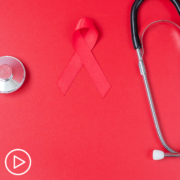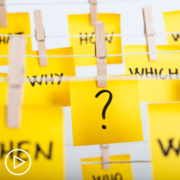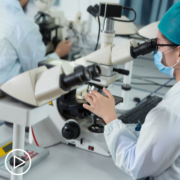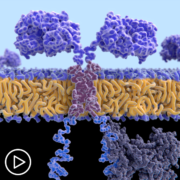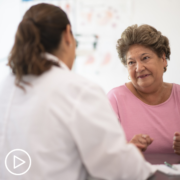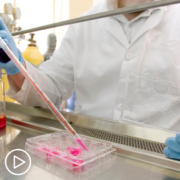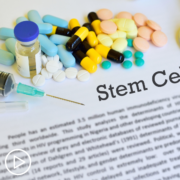Accessing Myeloma CAR T-Cell Therapy Clinical Trials from Patient Empowerment Network on Vimeo.
How has CAR T-cell therapy changed the landscape of myeloma care? Dr. Brandon Blue shares how this therapy has been a “game changer” in myeloma care, and how clinical trials for newer CAR T-cell therapies are advancing care and access for patients.
Dr. Brandon Blue is Assistant Member and Clinical Instructor in the Department of Malignant Hematology at Moffitt Cancer Center in Tampa, FL. Learn more about Dr. Brandon Blue.
See More from Evolve Myeloma
Related Resources:
Transcript:
Katherine Banwell:
Dr. Blue, we know that the approved CAR T-cell therapies are for patients who have already undergone several lines of treatment. How has this therapy revolutionized care for myeloma patients?
Dr. Brandon Blue:
Yeah. So, CAR T is really a game changer when it comes to multiple myeloma. I’ll tell you that previously people have seen a lot of the best medicines that we have, and unfortunately for a good percentage of people the disease just becomes what we call refractory.
And unfortunately, despite us giving them the best medicines, the disease still likes to survive. So, we had to think of something of what can still kill cancer, but may not be the traditional chemotherapy that people may think of? So, we say, “Well, let’s come up with CAR T because it’s a way to actually use the body’s own immune system to fight off those cancer cells.” And for myeloma it really has shown a lot of progress. And one of the things that we know now is that not only do we have one, but we have two products, and maybe even a third coming down the pipeline because there’s more and more of this CAR T becoming available.
And that’s better, and better for patients.
Katherine Banwell:
Absolutely. That’s great news. For patients who are recently diagnosed, Dr. Blue, is there any chance of accessing this treatment sooner? Maybe through clinical trials.
Dr. Brandon Blue:
Yeah. One of the biggest clinical trials that I think that people are excited about is trying to challenge something that we’ve been doing since the 1980s, which is stem cell transplant.
So, typically, when a person get diagnosed with multiple myeloma, especially newly diagnosed, stem cell transplant is typically part of the treatment plan. But now there’s clinical trials that are coming out where we challenge instead of maybe a patient going to stem cell transplant, maybe they might do CAR T instead. And we’re trying to figure out can something that we’ve been doing since the ‘80s be un-throned as the best standard practice? And so, I think that’s something that people are really excited about, that’s something I’m excited about.
And it gives people who are newly diagnosed a chance to get some of this novel therapy.
Katherine Banwell:
I have a follow-up question about the clinical trials, you mentioned that there is one going on. Where is it taking place?
Dr. Brandon Blue:
Yeah. So, it’s actually a multi-center study. And so, hopefully, we hope to have Moffit Cancer Center involved in that clinical trial, but it’s multiple different sites really all over the world because I think this is a question that everybody’s really excited about. Again, like I said, transplant has been happening since 1980s, and so for some treatment to come along to potentially challenge that, I think people are excited about a new contender. And we’ve already seen the progress that CAR T has already made.
And so, the big question is how well will it work when someone is newly diagnosed before their body has really seen all the extra treatments that are there? Will it work even better?
We’re very hopeful, and we’re very optimistic.
Katherine Banwell:
Where can people find out about this particular clinical trial and other clinical trials?
Dr. Brandon Blue:
Yeah. So, I tell people there’s so many different websites and resources. One of the main ones that is very readily accessible is clinicaltrials.gov, is very kind of easy, and intuitive. Typically, what you can do at clinicaltrials.gov is you can literally kind of just type in your disease process, and then they’ll tell you if it’s newly diagnosed, or relapsed. There’s also a place called SparkCures. SparkCures is fantastic organization that really tries to focus people, and get them matched with clinical trials, which is fantastic.
There’s also HealthTree. HealthTree not only helps people from a clinical trial standpoint, but they also have patient support programs because nobody wants to be in the fight for cancer by themselves. The American Cancer Society does a fantastic job, as well as Leukemia & Lymphoma Society.
The International Myeloma Foundation, or the IMF, and then the MMRF, the Multiple Myeloma Research Foundation. And there’s many more, but those are some of the top ones that we readily use that have a lot of information. And some of them have not only information for the patient, but also information for the family, and the caregivers. Because again, when someone gets diagnosed with cancer it doesn’t just affect the person, it affects the whole family.




